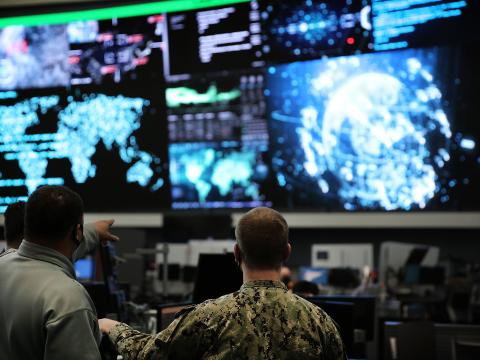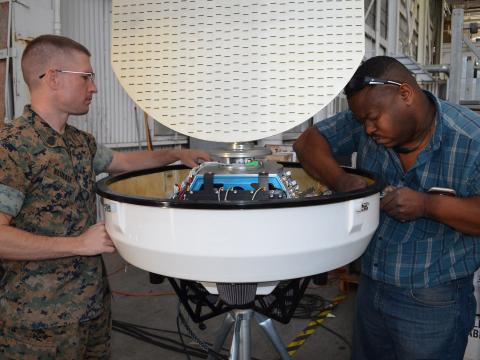NSA Director Defends Intelligence Workforce
Cyber Symposium 2013 Online Show Daily, Day 3
Gen. Keith Alexander, USA, who directs the National Security Agency (NSA) and commands U.S. Cyber Command, wrapped up the final day of the AFCEA International Cyber Symposium with a strongly-worded defense of the U.S. intelligence community, which is under fire following recently-leaked documents concerning the collection of data on the online activities of ordinary citizens in the United States and abroad. The general deviated from the topic of cyber long enough to address the controversy.
The NSA director said intelligence community employees protect the nation and civil liberties simultaneously. “These leaks have inflamed and sensationalized for ignoble purposes the work the intelligence community does lawfully under strict oversight and compliance. If you want to know who who’s acting nobly, look at the folks at NSA, FBI, CIA, and the Defense Department who defend our nation every day and do it legally and protect our civil liberties and privacy. They take an oath to our constitution—to uphold and defend that constitution,” he said. “They’re the heroes our nation should be looking at.”
During the question and answer session, Gen. Alexander also praised contractors who work for the intelligence community. “From my perspective, we couldn’t do our job without the contractors or the help we get from industry. That’s been absolutely superb. One individual has betrayed our trust and confidence, and that shouldn’t be a reflection on everybody else,” he stated.
In fact, he said, the United States government is one of the best in the world at protecting data on individuals. “Most nations around the world collect signals intelligence just like we do. And they’re governments use lawful intercept efforts that require and compel companies to provide the requested information. I think our nation is among the best at protecting our privacy and civil liberties,” he opined.
Gen. Alexander also expressed concern that more leaks could be coming and said the debate may influence the future of cyber. “As we look at cyber in the future, we’ve got to have this debate with our country: how are we going to protect the nation’s cyberspace. I think this is a debate that we can have with more transparency that on counterterrorism,” he added.
The general insisted the leaks have done great harm. “These leaks have caused significant and irreversible damage to our nation’s security. What is going on with these leaks is unconscionable in my opinion,” he declared.
He also repeated assertions that the monitoring programs have helped protect the United States and its allies on 54 occasions. The general indicated that the NSA took immediate steps to prevent future leaks and is cooperating with the FBI investigation. While he didn’t go into specifics about the preventive steps taken, he assured the audience that, “We’re doing this exactly right.”
Gen. Alexander was not the first presenter to bring up the leaks from former NSA contractor Edward Snowden. Brig. Gen. Kevin Nally, USMC, Marine Corps director of command, control, communications and computers and chief information officer, said the leaks suggest a need to refocus on the insider threat.
Gen. Nally also talked about the pending announcement concerning the winner of the Next Generation Enterprise Network (NGEN) contract, an announcement that was made in the hours following the symposium. “This is a big deal for us,” he said.
NGEN is expected to be a multi-billion contract and will replace the Navy/Marine Corps Intranet (NMCI) network implemented about a decade ago. The Marine Corps officially took full control of its network from contractors this month, and feedback from around the world has been positive, Gen. Nally indicated. “The perception throughout the Marine Corps from Okinawa to Europe, Korea, and around the world is that we’re getting things done more efficiently and effectively, and we’ve given flexibility back to the commanders,” Gen. Nally reported.
Capt. James Cash, USCG, deputy commander, Coast Guard Cyber Command, told the audience that although the Coast Guard is within Homeland Security office, he has coordinated closely with U.S. Cyber Command and his other military counterparts. The Coast Guard’s mission—including the cyber mission—is unique, he explained. “The Coast Guard has a sector-specific agency, the maritime transportation piece of the transportation sector and is responsible for protecting the critical infrastructure in that area. “We’re looking at how to work with our industry partners and our government systems that are part of that critical infrastructure to ensure that they are protected, that they perform good cyber hygiene.”
Maj. Gen. Burke Wilson, USAF, director, space operations, Headquarters U.S. Air Force, explained that cyber is all about improving operational effectiveness in other domains. “Mission outcome is the only reason we invest in this. We believe it will generate in better mission outcomes across the service,” he stated.
Additionally, the cyber force includes the entire force—not just those trained to operate, maintain and defend the networks, Gen. Wilson offered. “If we give you a keyboard, you are an operator in this domain,” Gen. Wilson said. He also maintained that cyber operations need to follow similar processes to other operational domains. “My experience with operational commanders is that if they’re not familiar with something, they don’t trust it, and they tend not to use it,” he said.
Lt. Gen. Rhett Hernandez, USA, commanding general, Army Cyber Command, talked about the convergence of cyber with other domains and said that the convergence of cyber with electromagnetic spectrum capabilities is key because military systems increasingly rely on both.



